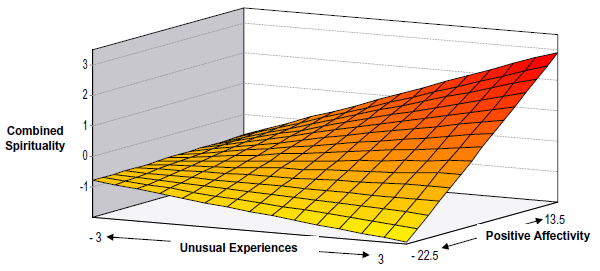Many highly spiritual people report experiences that are akin to mild versions of psychiatric illnesses. That’s not terribly surprising because, as researchers have learned, hallucinations and such like are actually a rather common part of the human experience.
Probably 70% of people experience some form of ‘unusual experiences’ at some time in their lives.
Now, you might think that hallucinations would be distressing, but people often report them to be quite pleasant. What’s more, spiritual people often report being happier than average.
James Schuurmans-Stekhoven, at the Charles Sturt University in Bathurst, Australia, speculated that that the two might be causally related. In other words, he thinks that when basically happy people have ‘unusual experiences’ like auditory hallucinations, it inclines them to a spirtual worldview.
To test this, he surveyed 485 Australians (average age 37 years) about their spirituality, their unusual experiences, and their positive affectivity (or mood).
What he found was quite a complicated relationship.
As you can see from the figure, as happiness and unusual experiences increase, so to does spirituality.
But if you look at the people with the lowest levels of unusual experiences (-3 on the graphic), then changing levels of positive affect has basically no effect on their spirituality. These people are not spiritual, regardless of their happiness levels.
And if you look at those with the least positive affective (the least happy), well their spirituality actually decreases slightly with increasing unusual experiences.
Schuurmans-Stekhoven says:
…spirituality might be the misattribution of pre-existing positive affect to odd stimuli that arise from odd perceptual events that happen to co-occur with free-floating positive affect. Such experiences are likely to differ from clinical delusions and obsessions in that despite lacking external correspondent value, spiritual aberrations are pleasurable.
Maybe there’s even a reinforcing effect at work. So if you’re feeling in a good mood, then experience something weird, that gets interpreted in a spiritual way that lifts your mood even further!
![]()
Schuurmans-Stekhoven, J. (2013). Is God’s call more than audible? A preliminary exploration using a two-dimensional model of theistic/spiritual beliefs and experiences Australian Journal of Psychology DOI: 10.1111/ajpy.12015
 This article by Tom Rees was first published on Epiphenom. It is licensed under Creative Commons.
This article by Tom Rees was first published on Epiphenom. It is licensed under Creative Commons.














